Spoken commentarial teachings at Gyuto Tantric Monastery
At the fervent request from Gyuto Tantric Monastery, Dharamsala, His Eminence Prof. Samdhong Rinpoche kindly bestowed at Gyuto Tantric Monastery a nine-day spoken commentarial teachings and transmissions, on the highest integrating Tantra of Saying Manjushri Names and its Extensive Commentary by Gyalwa Gedun Gyatso (His Holiness the Second Dalai Lama {1476-1542}). 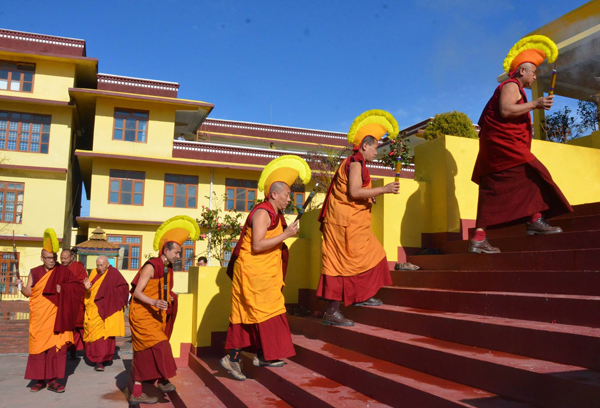 The teachings commenced on March 7, 2015 and continued till the late afternoon of March 17, 2015. There were daily two sessions a day of teachings, which were attended by the practitioner-scholars of Gyuto, sangha—practitioner scholars, hermits—from around Dharamsala, and from major monastic seats in southern India, sangha from all regions of the Himalayas, and a large number of lay devotees. Of the international attendees, there were sangha and lay practitioners from various countries.
The teachings commenced on March 7, 2015 and continued till the late afternoon of March 17, 2015. There were daily two sessions a day of teachings, which were attended by the practitioner-scholars of Gyuto, sangha—practitioner scholars, hermits—from around Dharamsala, and from major monastic seats in southern India, sangha from all regions of the Himalayas, and a large number of lay devotees. Of the international attendees, there were sangha and lay practitioners from various countries.
Kyabjey Samdhong Rinpoche left a break of two days—March 11 and March 12—so that everybody could attend the two days of Opening Ceremony and Teachings at Sherab-ling, by His Holiness the Dalai Lama.
In the morning of the final day of the teachings, that is, on March 17, 2015, Gyuto Tantric Monastery offered a formal Ceremony of Request to Kindly Live Long for the welfare of all sentient beings and for the precious sublime teachings to remain prevailing.
The daily reports of the each day of the teachings are as follows.
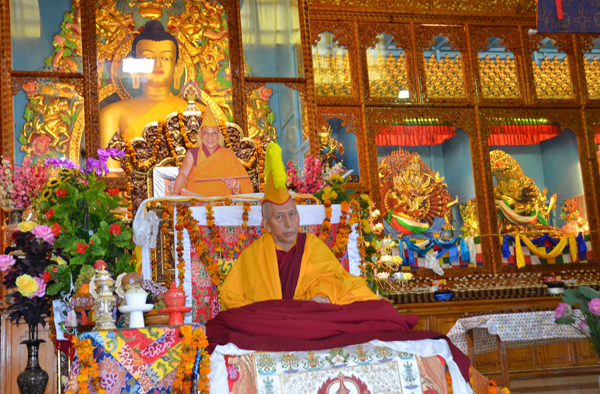 March 17, 2015
March 17, 2015
Today, on the ninth day, the final day, of teachings on Saying Manjushri Names, by Kyabjey Samdhong Rinpoche, at the glorious Gyuto Monastery, Kyabjey Rinpoche at the start advised the need for reflecting and generating joy on the fact that one has attained all the positive factors for practising the teachings: One has the precious difficult-to-attain human rebirth complete with the attributes of leisures and endowments, one has met with the Teachings where the instructions from both Discourse (Sūtra) and Protecting Methods (Mantra, Tantra) are complete, one is being fostered kindly by a Teacher of the Great Vehicle path, and that one has the mental capability to discern well [the faults of the ordinary mind] to discard away and the virtues to adopt; and thereby listen to the sublime teachings by eschewing the three faults akin to a defective container (turned upside down, broken bottom and defiled inside).
Subsequent to that, Kyabjey Rinpoche gave the spoken commentaries of the remainder of the text, through “the literal-meanings explanations”, the chapters covered were from chapter nine onwards through to the end of the text—comprising of chapters of Praise to the sameness Pristine Wisdom, Praise to Activities-Accomplishing Pristine Wisdom, Praise through the five Pristine Wisdoms, Mantra Chapter, and Rejoicing Chapter.
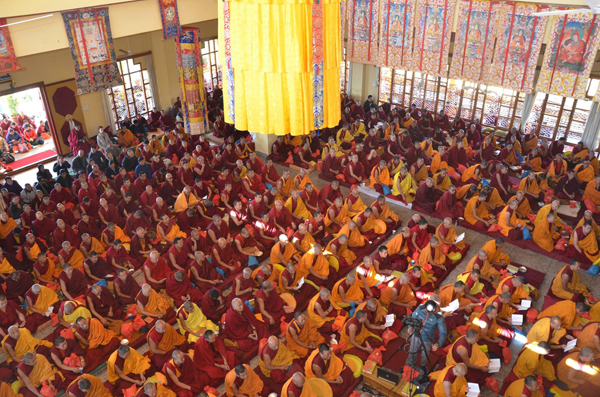 At the end Kyabjey Rinpoche pointed out the rarity of persons who do studies and meditative reflections on this text by going beyond merely daily reciting Saying Manjushri Names as a rectitation text, although it is the king or essence of Tantras.
At the end Kyabjey Rinpoche pointed out the rarity of persons who do studies and meditative reflections on this text by going beyond merely daily reciting Saying Manjushri Names as a rectitation text, although it is the king or essence of Tantras.
Thereafter at the conclusion Kyabjey Rinpoche referred to the numerous Indian and Tibetan Commentaries and advised the need to do studies on them; the methods of reciting Saying Manjushri Names; the lineage continuity of the transmission of the spoken commentary.
Kyabjey Rinpoche concluded these teachings with the advice for the ordained members of the monastery in general and all to observe well the vows and pledges—this being a Tantra-context teachings and practices—and the importance at the end, like with the beginning importance of pure motive, of sealing one’s deeds with prayers and dedications towards full enlightenment for the welfare of all sentient beings.
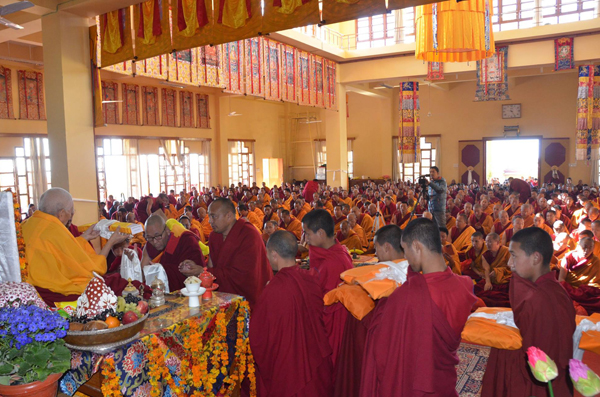 March 16, 2015
March 16, 2015
Today, on the eighth day of teachings by Kyabjey Samdhong Rinpoche, at Gyuto Monastery, Kyabjey Rinpoche advised at the start the need to set motive and conduct in listening to the sublime teachings, a [benevolent] motive, thinking: For the welfare of all sentients beings whose numbers are infinite as the limitless extent of the space, I must at any rate attain the precious state of the perfectly complete Buddha (enlightenment); for that purpose I will listen to the sublime teachings on the profound path of Varjra Vehicle, —along with such a motive, one needs to forsake the three modes of defective listening akin to the three faults of a container, and apply the six awarenesses (recognitions).
Thereafter Kyabjey Rinpoche gave the literal-meanings explanations of the main text’s chapter eight, the chapter of Praise to Individual-Realization Pristine Wisdom. Following that, Kyabjey Rinpoche kindly bestowed the transmissions from the main text of Saying Manjushri Names, of chapters nine, ten and eleven —the chapters of Praise to The Very Equal Pristine-Wisdom, Praise to Activities-Accomplishing Pristine Wisdom, and Praise to the Five Lineages Through the Five Pristine Wisdoms, respectively.
Likewise, Kyabjey Rinpoche also gave explanatory commentary, along with transmission, from Extensive Commentary, of the chapters nine to thirteen, the latter two chapters being Mantra Chapter and Rejoicing Chapter.
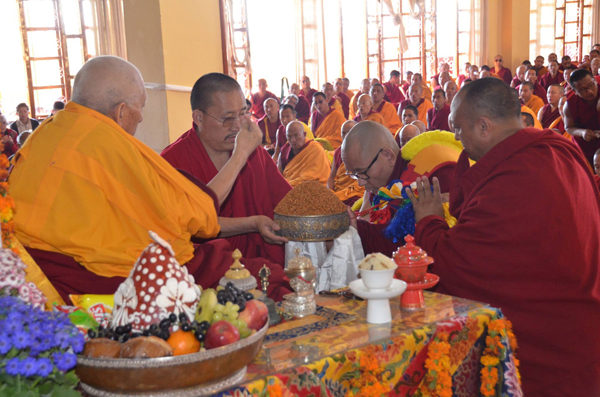 March 15, 2015
March 15, 2015
Today, on the seventh day of teachings by Kyabjey Samdhong Rinpoche, at Gyuto Monastery, Rinpoche advised at the beginning to set the motive and conduct in listening to the sublime teachings, that, for the welfare of all mother sentient beings one aspires to attain the precious state of the perfectly complete Buddha, and for that purpose one thinks of listening to the sublime teachings.
With the actual teachings, Kyabjey Rinpoche gave the literal-meanings explanation of the remaining verses—Verse 10 onwards—of the sixth chapter, the chapter of Praise to Dharmadhatu Pristine Wisdom, and of chapter seven, the chapter of Praise to Mirror-like Pristine Wisdom.
From Extensive Commentary Kyabjey Rinpoche kindly gave the explanatory commentary–along with transmission–on chapter seven, and on chapter eight, the chapter of Praise to Individual-Realization Pristine Wisdom.
March 14, 2015
Today, on the sixth day of the spoken commentarial teachings by Kyabjey Samdhong Rinpoche, on Saying Manjushri Names and Gyalwa Gedun Gyatso’s Extensive Commentary, at Gyuto Monastery, Rinpoche advised the need for setting a pure motive, thinking: For the welfare of all kind mother sentient beings whose numbers are infinite like the limitless extent of the space, I must at any rate attain the precious state of perfectly complete Buddha (enlightenment); for that purpose I will listen to the sublime teachings of the profound Secret Mantra Path—t o set such a motive and maintain an appropriate conduct [during the teaching sessions], as instructed from teaching on Stages of the Path to Enlightenment.
Kyabjey Rinpoche thereafter kindly gave explanatory commentary—along with transmission—on the sixth chapter, the chapter of Praise to Dharmadhatu Pristine Wisdom (Reality Sphere~), from Extensive Commentary.
Subsequent to that, for the benefit of all practitioners and scholars in general, Kyabjey Rinpoche gave very lucidly the literal-meanings explanations of the sixth chapter—up to its Verse 9—of the main text of Saying Manjushri Names, which would be of benefit especially to practitioners who daily recite the text.
March 13, 2015
Today, on the fifth day of spoken commentarial teachings by Kyabjey Samdhong Rinpoche, on Saying Manjushri Names, at Gyuto Monastery, Rinpoche instructed at the start the need for setting pure motive, that, for the welfare all kind mother sentient beings one aspires to attain at any rate the perfectly complete Buddhahood, and for that purpose one thinks of listening to the sublime teachingss—thus setting a pure motive and maintaining an appropriate conduct [during the teaching sessions], as advised from teachings on Stages of the Path to Enlightenment.
Subsequent to that, Rinpoche kindly gave the literal-meaning explanations of the third chapter, the chapter of Looking at The Six Lineages, up to the fifth chapter, the chapter of Enlightenment-Mind Vajra.
This was followed by Rinpoche kindly bestowing the transmission of the main text of “Saying Manjushri Names”, from the fifth chapter—Enlightenment-Mind Vajra Chapter—u p to the eighth chapter, the chapter of Praise to Individual-Realization Pristine Wisdom.
Rinpoche thereafter explained, from Extensive Commentary, the fourth chapter, Illusory-Displays Net Thorough-Perfection Chapter, up to the conclusion of the fifth chapter, Enlightenment-Mind Vajra Chapter.
(Two days of break—March 11-12—so that all could attend teachings by His Holiness the Dalai Lama, at Sherab-ling)
March 10, 2015
This afternoon, on the fourth day of spoken commentarial teachings, by Kyabjey Samdhong Rinpoche on Saying Manjushri Names, at Gyuto Monastery, Rinpoche advised all to listen to the sublime Great Vehicle teachings — particularly that of the profound path of Vajra Vehicle—w ith the motive of aspiring to place all mother sentient beings in the perfectly complete Buddhahood.
In continuation from yesterday’s sessions (daily two sessions of teachings), Rinpoche then gave “the essence-meaning explanation” or the definitive-meaning explanation of the first chapter, Request Chapter, of Saying Manjushri Names, advising that with this guidance elucidation of the first chapter, the twin-explanations (literal and “essence-meaning”) need to be applied and understood with the rest of the text.
Thereafter Rinpoche explained the literal meanings of the main text’s second chapter, Reply Chapter, and the third chapter, the Chapter of Looking at the Six Lineages. Subsequent to that, Rinpoche kindly gave commentarial teachings on Omniscient Jey Gedun Gyatso’s Extensive Commentary, completing the explanation and transmission of the Commentary’s part on the third chapter.
March 9, 2015
Today, on the third day of teachings by Kyabjey Samdhong Rinpoche at Gyuto Monastery, Rinpoche advised at the start on appropriate modes of motive and conduct, during teachings, as instructed in Stages of the Path to Enlightenment teachings.
Subsequent to that, Rinpoche explained—while kindly bestowing the transmission at the same time—the section on “Engaging in the actual explanation of the words and meanings”, of the Extensive Commentary’s first chapter, The Request Chapter, up to the second chapter, The Reply Chapter.
For the benefits of both the adepts and the ordinary beginners—especially for the general beginners—Rinpoche very kindly elucidated so clearly in today’s second session the meanings of the words of the verses of the first chapter, The Request Chapter, of Saying Manjushri Names.
March 8, 2015
Today, on the second day of spoken commentarial teachings on Saying Manjushri Names, by Kyabjey Samdhong Rinpoche, at Gyuto Monastery, Rinpoche advised at the start the need for a pure motive when engaging in explaining and listening to the Teachings, that at the least it should be a presently generated bodhichitta (altruistic enlightentment aspiring thought).
After that, Rinpoche kindly bestowed the explanatory transmission of Saying Manjushri Names up to its fourth chapter, the chapter on Thorough Perfection Stages of Illusory Net (Mayajala-abhisambodhi).
Rinpoche then kindly gave the transmission of Gyalwa Gedun Gyatso’s Extensive Commentary, while touching upon by way of explanation the purports of the lines in context. They included: Explaining the way the Highest Tantras’ thoughts (contents) are elucidated in general; and specifically that of the tantra of Saying Manjushri Names. The transmission of the Extensive Commentary, interspersed with insightful explanations by Rinpoche, was up to the end of “The general presentation” intoday’s second session.
March 7, 2015
Today, on the first day of spoken commentarial teachings on Saying Manjushri Names, the main text, and the Extensive Commentary (The Great Sun Making Visible The Suchness of Vajrayoga) by Gyalwa Gedun Gyatso (His Holiness the Second Dalai Lama {1476-1542}), at Gyuto Monastery, by Kyabjey Prof. Samdhong Rinpoche, Rinpoche kindly began the teachings, advising the following, as the preliminary instructions:
By advising on the difficulty of attaining a human rebirth complete with attributes of leisures and endowments, the great meaningfulness of it, and yet easy perishbility of it, the need to draw essence (meanings) out of this human life we have now; the need to listen to Dharma (teachings) with a pure altruistic motive.
As a background introduction to the Tantra of Saying Manjushri Names, Rinpoche explained: Of the three ways this Tantra of “Saying Manjushri Names” was elucidated—towards Yoga Tantra, towards the Highest Tantra and towards Kalachakra system—here the Extensive Commentary by Gyalwa Gedun Gyatso elucidates it towards Kalachakra system. Rinpoche explained in a great detail the time and place of Buddha teaching Saying Manjushri Names; the chronology and details on its translation into Tibetan, and in other languages; the extant manuscripts in Sanskrit language of Saying Manjushri Names; the size of the text (i.e., the number of chapters); the number of Indian Commentaries, and subsequently of Tibetan commentaries; and so forth.
Rinpoche expressed the hope that by this spoken commentary this time young Geshes and scholars would become interested in doing in future specialised studies into Kalachakra, and that its presentation on numerous phenomena—time, partcles, and so forth—which can go parrallel with modern science, could be included as contribution towards presentation of “Buddhist science”, in the three-part classification by His Holiness the Dalai Lama: Buddhist science, Buddhist philosophy and Buddhist practice.